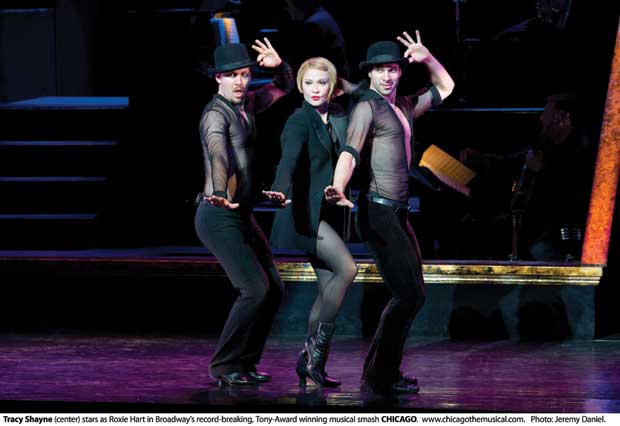Enjoy extra cheese served piping hot, ‘Chicago’ style

CELL BLOCK TANGO FOR THREE | Tracy Shayne, center, is upstaged by the undulating hips of the chorus boys who embody the look of a Fosse show. (Photo courtesy Jeremy Daniel)
ARNOLD WAYNE JONES | Life+Style Editor
Everything you really need to know about what made Bob Fosse a brand you can see within the first five minutes of Chicago, now at the Winspear from the Lexus Broadway Series: Leggy gals in skin-tight leotards and high heels writhing orgiastically spread-eagled over chairs; limber, hunky men in even tighter fitting hip-huggers showing off every contour of their rockin’ glutes and abs; and all of them in bowler hats, shaking their jazz hands, shimmying their shoulders and moving in staccato, suggestive steps. It’s all androgynously sexy, with a feline stealth that’s bound to titillate (and possibly confuse) the most chaste of audience members.
 And isn’t that what you go to theater for?
And isn’t that what you go to theater for?
Even if not, it’s what Chicago does, and does exceptionally well. The show was a big hit when it opened in 1975 — it ran for more than two years — but it was shut-out at the Tony Awards, bested largely by an even huger hit, A Chorus Line. It wasn’t until the revival hit in 1996, at the height of the O.J. Simpson trial, that the show really dug in with the public consciousness, with its tale of a media frenzy over “celebrity” murderers — vacuous dregs of society famous for being famous. In 50 years or so / it’s gonna change, ya know sing the merry murderesses Velma (Terra C. MacLeod) and Roxie (Tract Shayne) about the mindless fascination with celebrity; even in 1975, that was meant to be cheeky. Nowadays, living it the post-Kardashian apocalypse, it seems more sadly relevant than ever. (Chicago got its revenge: The revival has now exceeded A Chorus Line’s record-breaking run.)
Perhaps that frustrating timelessness is why the show endures — even after numerous national tours of Walter Bobbie’s pared-down staging (re-created here by Scott Faris), which have come through North Texas over the past decade-plus. The production’s Billy Flynn, John O’Hurley, was in Fort Worth last year with this very show.
I had thought I’d had my fill of Chicago, that its familiarity would be its undoing, at least for those who hadn’t seen one of the prior tours or the Oscar-winning film. But Kander and Ebb’s score bursts with so many catchy, now-classic showtunes it snags you early. You can’t help but revel in how nearly every song seethes with irony, from Roxie’s minor-key torch song to her schlubby hubby (Ron Orbach, who’s great) to Billy’s “All I Care About Is Love” as he cravenly pretends to care about anything other than money. Rarely has a score so carefully undercut its lyrics with their meaning.
Of course, there’s irony in the casting of O’Hurley himself — a celeb designed to get butts in the seats with the same calculation of the trials at the heart of the musical. The good news is, he’s well-suited for the role with his slick smile and surface charm (and he can sing).
MacLeod delivers, too, as Velma. But the show is really stolen by Kecia Lewis-Evans as Mama Morton. She commanded the audience’s attention on opening night with her unique phrasing on “When You’re Good to Mama,” belting it out like Liz Mikel. She had the audience nearly up on their feet, something that seemed to happen again and again.
Do we need another Chicago? Maybe not. But despite some pacing problems in Act 2 (and mostly the fault of Shayne, whose Roxie lacks charisma), the production feels as contemporary in its message as it ever did … and it does so with lurid, primal appeal. When sex is served up to you on a platter, it’s hard not to join in the feast.
This article appeared in the Dallas Voice print edition August 17, 2012.

